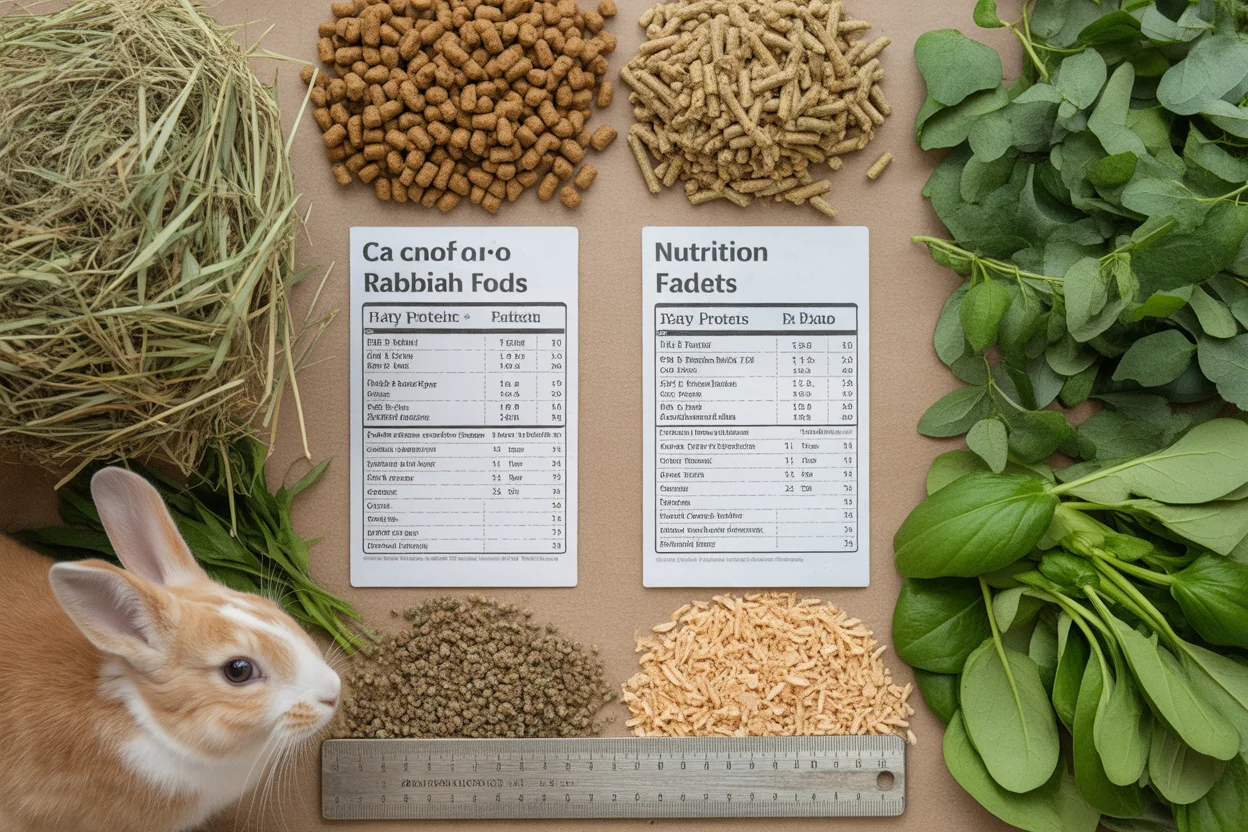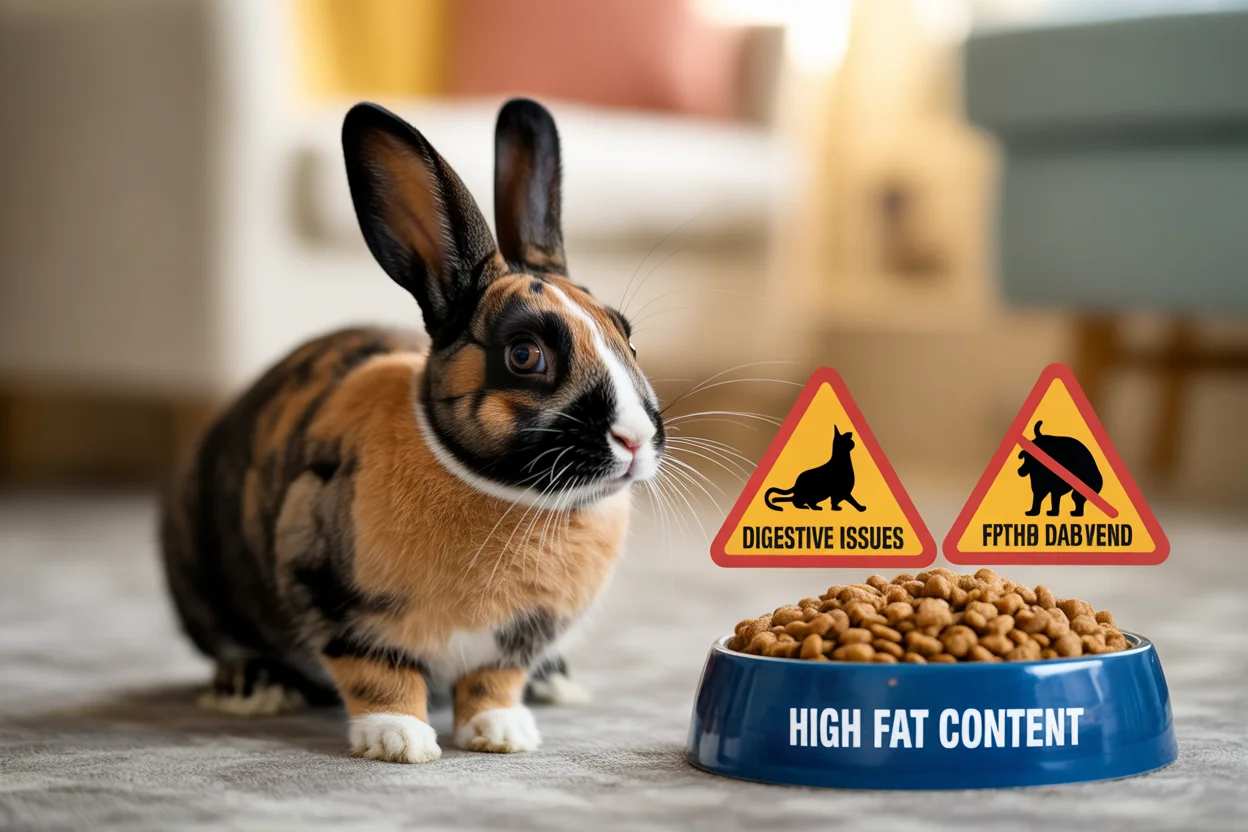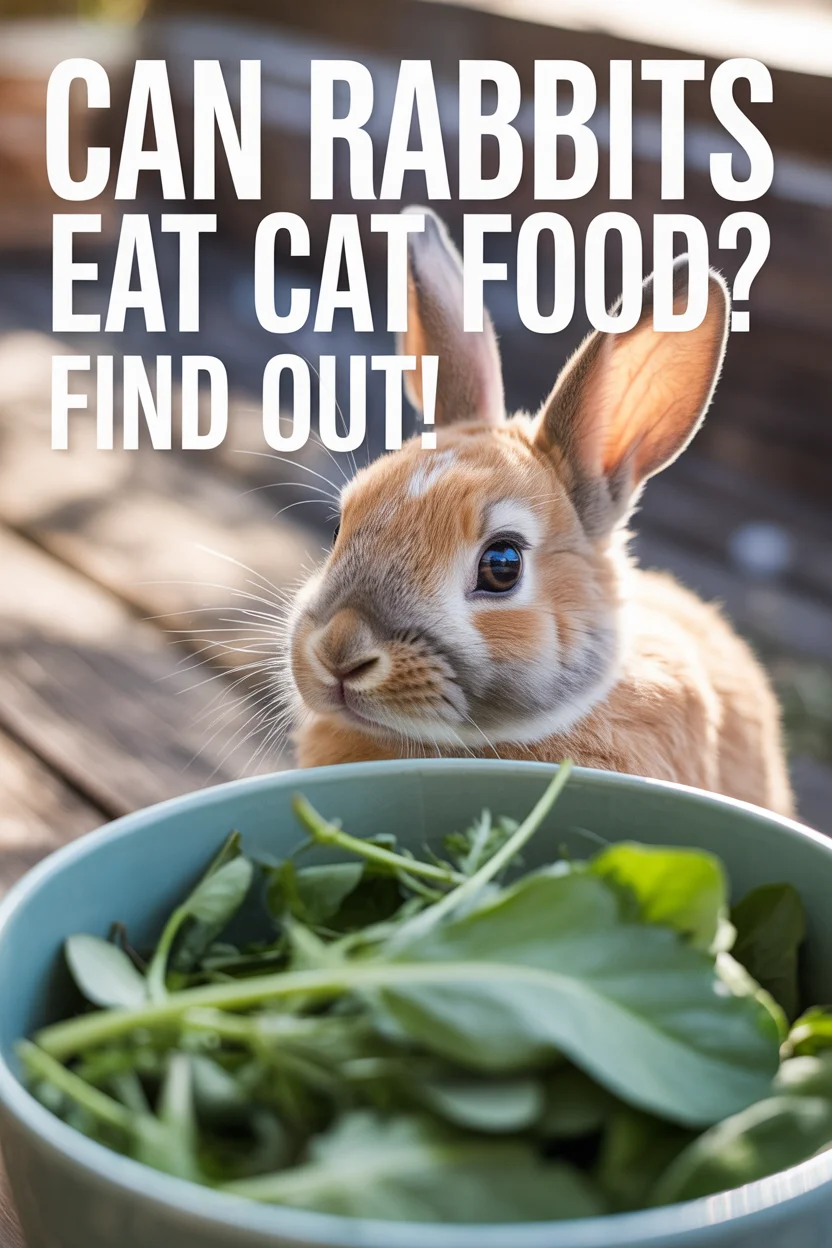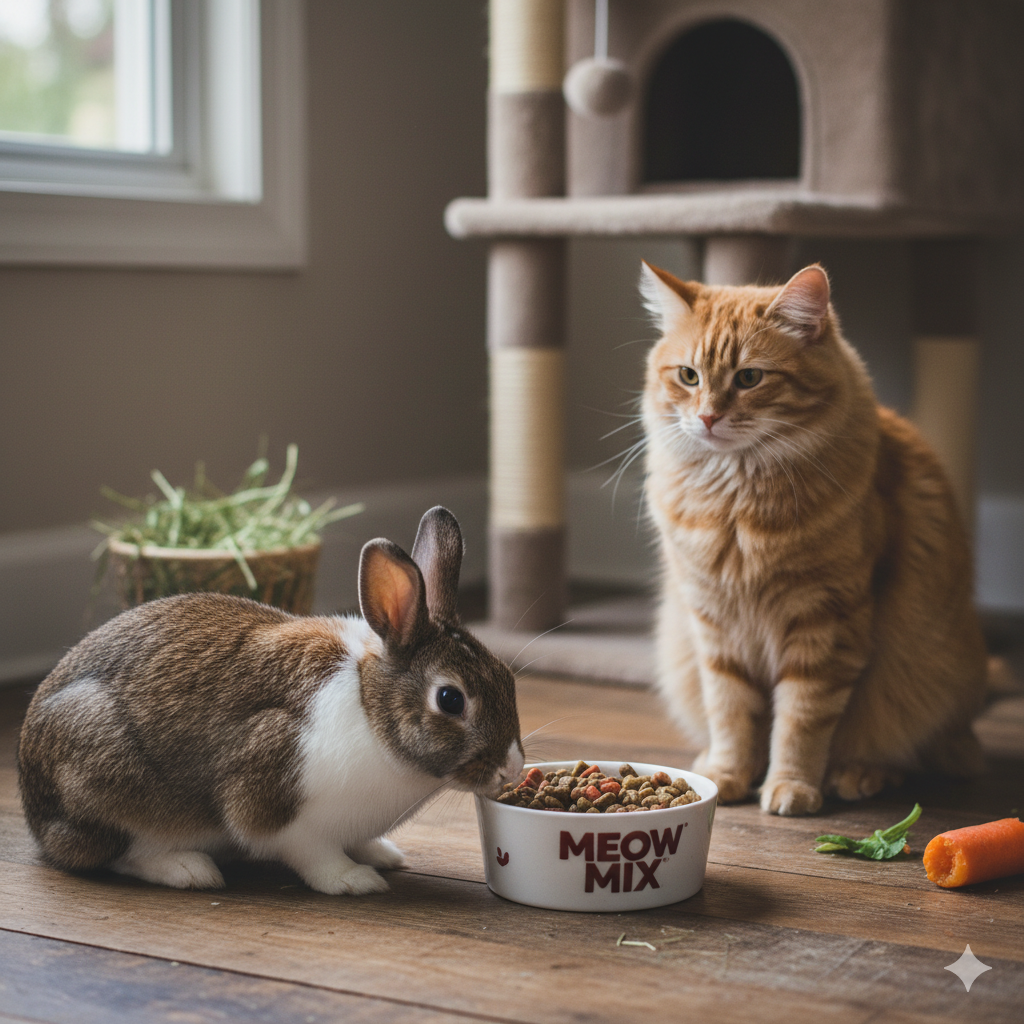- Can Rabbits Eat Cat Food? (Short Answer + Safer Choices)
- Why Cat Food Is a Poor Choice for Rabbits
- “My Rabbit Just Ate Some Cat Food”—What To Do
- What Rabbits Should Eat Instead (Daily Diet)
- Safer “High-Protein” Situations (Common Myths)
- Preventing Cross-Feeding in Multi-Pet Homes
- Keep Your Bunny Hoppin’—Don’t Feed Cat Food!
Can rabbits eat cat food? I get asked this surprisingly often—maybe you caught your rabbit sneaking a crunchy bit out of your cat’s bowl, or you’ve just run out of rabbit pellets and thought, “Hmm, it’s all pet food, right?” Maybe you’ve run down one of those kitchen rabbit holes (guilty as charged—I once Googled if rabbits could have peanut butter toast…). Just for the record, it’s really important to figure out pet food swaps the safe way, not just play it by ear. If you’re curious about safely switching up animal diets, check out this guide on can cats eat eggs or the lowdown on cat bread snacks. But today, let’s chew through the facts about bunnies and cat food—trust me, this might surprise you.

Can Rabbits Eat Cat Food? (Short Answer + Safer Choices)
Let’s cut right to it: No, you shouldn’t let your rabbit eat cat food. It isn’t just “not ideal;” it’s genuinely risky for your bunny’s belly. Rabbits need a totally different diet—think leafy, earthy, hay-stuffed—not the fishy, protein-loaded bites our feline overlords devour. If Fluffy nibbled a bit by accident, don’t panic (minor slip-ups happen), but let’s get into the details so you’ll know what’s safe, what’s not, and what’s a total “no, nope, never.”

Why Cat Food Is a Poor Choice for Rabbits
Herbivore vs. Carnivore Nutrition
- Rabbits are strict herbivores, basically nature’s little lawn mowers—hay, grass, veggies.
- Cats are obligate carnivores (fancy way of saying, “Give me meat or give me… nothing?”).
- So, what’s fuels a cat simply won’t fuel a rabbit—and might even cause harm.
Protein, Fat, and Fiber Mismatch
- Cat food is loaded with animal protein and fat, not a lick of roughage.
- Rabbits need super-high fiber for their gut (that’s what hay is for)—cat food has barely any.
- Not enough fiber = bunny digestive slow down (which is about as fun as rush hour traffic).
Additives & Ingredients to Avoid
- Cat food often contains meat meals, fish oil, sodium, preservatives.
- These might be fine for whiskers, not for whiskered bunnies.
- Some ingredients just aren’t tested—or safe—for rabbits.
Potential Health Risks If a Rabbit Eats Cat Food
Digestive Upset & GI Stasis
- Cat food can quickly lead to diarrhea, loss of appetite, and, scariest of all, GI stasis.
- That’s when your rabbit’s gut goes on strike—call the vet if you see no droppings for 12+ hours.
Obesity, Liver & Kidney Strain
- All that fat/protein: makes rabbits overweight and messes with their organs over time.
- Think of it like feeding a toddler steak sandwiches every day. Hard pass.
Microbiome Disruption
- Rabbits’ cecum (fancy word for their gut) needs certain bacteria—that balance gets messed up by “foreign” food.
- Cat food can totally flip their good bacteria overboard.
Allergic or Intolerance Reactions
- Signs: lethargy, weird poop, grumpiness, hunched posture, not eating.
- Basically, if they start acting odd after the “cat kibble incident,” time to worry a bit.
“My Rabbit Just Ate Some Cat Food”—What To Do
Immediate Steps
- First, take away the cat food—yes, even if your rabbit acts like it’s the best snack ever.
- Watch and wait: Make sure your bunny is still eating hay and drinking water.
Red-Flag Symptoms
- No poop, no cecotropes, obviously bloated, or bunny sits hunched and miserable.
- When in doubt—call the vet!
When It’s an Emergency
- If your bunny isn’t pooping or seems extremely unwell after a few hours—go to the vet immediately.
- Tell the veterinarian exactly how much was eaten and when. (No shame, it happens.)
What Rabbits Should Eat Instead (Daily Diet)
The 80/15/5 Rule
- 80% grass hay (timothy, orchard, etc.)
- 15% leafy greens
- 5% pellets or occasional treats
This isn’t complicated math—it’s the gold standard for a healthy rabbit diet. And if you’re wondering can rabbits eat cat food, the answer is no—stick to this 80/15/5 balance for their safety.
Safe Leafy Greens List
Romaine lettuce, cilantro, parsley, bok choy—basically a fresh “salad bar.”
⚠️ Skip iceberg lettuce; it’s just watery filler with no nutrients.
Treats in Moderation
Think of treats as dessert, not the main course. A slice of carrot, a tiny cube of apple (no seeds!), or a single blueberry on a special day is plenty.
Too many treats = overweight bunny.
Water & Forage Enrichment
- Always keep plenty of fresh water; swap or change bowls daily.
- Offer chew toys and rotate hay varieties to keep your rabbit engaged and prevent boredom.
Safer “High-Protein” Situations (Common Myths)
Growing/Underweight Rabbits
- Some folks think cat food is a protein booster if your rabbit looks thin—no no no!
- Ask a rabbit-savvy vet and use alfalfa hay or special pellets designed for young/growing buns.
Post-Illness Recovery
- After illness, use critical-care rabbit formulas your vet recommends—never cat food.
- They’re tailored for herbivores, not meat-eaters.
Preventing Cross-Feeding in Multi-Pet Homes
Feeding Zones & Schedules
- Put the cat’s bowl up high—rabbits love floor food, not shelf food! Easy fix.
- Try timed feeders or physical barriers if you’ve got a nosy herd.
Training & Environmental Tweaks
- Get creative: give cats puzzles for food; hide food between meals so bunnies can’t “bunny-hop” into trouble.
- Supervise free-roam time when everyone’s hungry—or someone will swipe someone’s dinner.
Keep Your Bunny Hoppin’—Don’t Feed Cat Food!
Listen, I get it—when you’ve got pets of all stripes, bowls sometimes get swapped, and the strangest things end up in the wrong tummies. But cat food is a definite “no” for rabbits—their bellies just aren’t built for that carnivore cuisine. Want to stay on the safe side? Build a solid bunny diet with confidence using this thorough cat nutrition tips and daily cat care routine as crossover inspiration. If you’ve ever worried or want to see what the rabbit community says, check out folks on r/Rabbits discussing cat food snacks or read about real cases at Rabbit Eating Cat Food: Risks And Prevention. Hey, if your rabbit keeps sneaking bits, this other Reddit thread on “Help my rabbit likes eating my cats food” can help you troubleshoot. So look, stick to hay, greens, and appropriate rabbit treats—you’ll have a five-star happy bunny, zero vet visits, and way less stress at feeding time.

Can rabbits eat dry cat food?
No, rabbits should not eat dry cat food. Cat food is high in protein and fat, while rabbits need a fiber-rich diet based on hay. Eating it regularly can upset their digestive system and cause serious health problems.
What if my rabbit ate a small amount once?
If your rabbit nibbled just a small piece of cat food once, don’t panic. Watch for changes like loss of appetite, diarrhea, or bloating. If symptoms appear, contact your vet right away.
Is wet cat food safer?
Wet cat food is not safer for rabbits. It still contains animal protein and fats that rabbits cannot digest properly. Stick to hay, fresh vegetables, and rabbit-safe pellets instead.
Can rabbits eat dog food?
No, rabbits cannot eat dog food either. Like cat food, it’s designed for carnivores and omnivores, not herbivores. Feeding rabbits dog food may lead to obesity, GI stasis, or other digestive issues.
What pellets are best for rabbits?
Choose high-fiber rabbit pellets made primarily from timothy hay or alfalfa (for young rabbits). Avoid mixes with seeds, corn, or colored bits, as these can cause selective eating and health problems.
Signs of GI stasis to watch for?
GI stasis is a life-threatening condition in rabbits. Warning signs include: not eating, fewer or no droppings, hunched posture, and lethargy. If you see these symptoms, contact your vet immediately.
